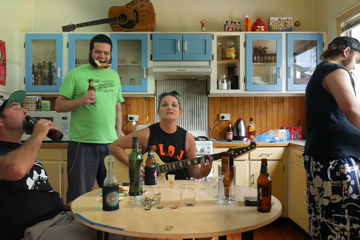I like to think of it as fantasy music, as opposed to reality music," says Joe Gould, drummer for The Crooked Fiddle Band. "We're not writing about the day-to-day of our lives, we're writing about these surreal landscapes. If it was a movie, it would definitely be a sci-fi post-apocalyptic fantasy kind of deal." The Sydney quartet is on a countrywide tour to launch second long-player, Moving Pieces Of The Sea. "The music is very intense and very dynamic. I think it really has this nervous energy about it that goes to some very dark, dense places and some very expansive ones in turn." The Crooked Fiddle Band began in 2006, when violinist Jess Randall asked Gould and guitarist Gordon Wallace to help her record an album exploring the various iterations of a particular traditional folk tune. Their chemistry was immediate and anarchic, and from that a uniquely spirited sound was born. Sometimes called 'chainsaw folk', sometime '14th century Romanian metal', the band blends the energy of punk with the fierce heart of gypsy music. With the new album, the band channelled some of that fury into longer-form songwriting. Moving Pieces Of The Sea features just seven tracks, four running over six minutes. "There's a little bit more settling on one idea. We do change it up quite a lot, but there's a real meditative feel, even when it's quite heavy…We really take that cinematic quality and run with it on this one," Gould says, describing the result as "somewhat post-rock".
Written partly in the Blue Mountains and partly during a European tour, the album was recorded by legendary US producer Steve Albini, their second outing with him – he produced their 2011 debut, Overgrown Tales – but the first in which they elected to record directly to analogue tape. "Getting over the safety net of computer recording, that was a big safety net for the band." Playing live, recording new takes over old, he describes it as a massive learning curve. "I think the great thing about that process is that it rewards you for playing well. We were all set up, with the drums in a slightly different room behind glass doors, and most of the time we were just playing through. The process can be much faster – if we rehearsed well and played it well, that's it, it was done. But once or twice that really caught us out and we thought we could do it better than we had just done – we spent hours and hours doing it over and over before we finally realised that take two should have been the one we kept."
Albini, true to reputation, had little to say. Gould describes him as a scientist who works to deliver the sound the band has envisaged. "It was really rare to hear him say something like, 'I really like that music you wrote'. Instead he'll say, 'It sounds like you got what you wanted on that one'. And in the end, it worked. We got everything right to the spot that we wanted."















